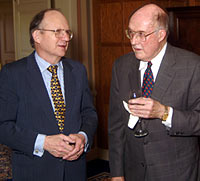Supreme Court Justices Should Shun Other Duties, Rehnquist Says
 |
| A.E. Dick Howard '61 with the Chief Justice. |
Justices risk compromising the dignity of the Supreme Court when they undertake other duties—such as Earl Warren’s report on the assassination of John F. Kenned—that distract them from their paramount judicial role, Chief Justice William Rehnquist said April 11 in a lecture at the Law School sponsored by the Thomas Jefferson Center for the Protection of Free Expression.
“Justices should be extremely wary of taking on such duties,” Rehnquist said, fearing that their involvement in the business of the executive branch of government might potentially compromise the independence and dignity of the judiciary in the public’s eye.
The Chief Justice described a half-dozen cases in the history of the high court when members have agreed to perform tasks pressed on them by presidents, contending that the only permissible instance was the disputed presidential election of 1876, in which five justices were called upon to help resolve whether Republican Rutherford B. Hayes of Ohio or Democrat Samuel Tilden of New York was the winner. Rehnquist is currently writing a book on those events. His talk was the fifth annual Henry J. Abraham Distinguished Lectureship, which honors its namesake, a University professor emeritus famous as a scholar of constitutional history. Mr. Abraham was on hand for the lecture.
Among the instances Rehnquist reviewed were John Jay’s and Oliver Ellworth’s mission to Paris in 1794 to resolve the undeclared war with France; Melville W. Fuller’s declining a request to head a peace commission to end the Spanish-American War, Justice Owen J. Robert’s investigation into American preparedness after the Pearl Harbor attack in 1941, Harlan Stone’s demurring soon thereafter from a chance to report on the supply of rubber for the war effort, Justice Robert H. Jackson’s role in the Nuremberg trials of Nazi war criminals, and Chief Justice Earl Warren’s report concluding that Lee Harvey Oswald acted alone in assassinating President Kennedy. Jay’s emissary came at such an early date in the history of the court—the court heard only six cases in the year he was gone—that his absence was not injurious and history has judged that he struck the best treaty likely possible from the American interest. Jay was also elected governor of New York while he was in Europe.
Fuller was right to decline the role on the peace commission, Rehnquist said. He allowed that Robert’s report finding that Navy and Army leaders had failed to take warnings of a Japanese attack seriously or coordinate possible responses was an important document, but it wasn’t necessary that Roberts do it. Rehnquist was harsher on Jackson’s involvement in the war crimes trials, agreeing with Justice Harlan Stone’s opposing argument at the time that a justice should not do executive or legislative work where his actions are not supported by reference to precedent. Jackson, Rehnquist acknowledged, called his service on the tribunal the crowning achievement of his life. Earl Warren’s efforts were “not in the interest of the Supreme Court,” Rehnquist said, because Warren was distracted from the heavy docket of the court and he ended up endorsing the improbable path of “the magic bullet” that struck both Kennedy and Texas governor John Connally.
The only instance to pass muster with
the Chief Justice was the election of 1876, in which he concluded
that the 15-man commission
headed by Justice Nathan Clifford, which included four other
sitting justices, “may have saved the nation from armed
conflict,” by ruling (with the Republican majority) that
Hayes had won. Tilden had 184 of the 185 electoral college votes
needed to win, but the lack of one vote gave Hayes’ supporters
another chance to influence the electors being selected in Florida,
Louisiana, and South Carolina. These states ultimately backed
Hayes on the condition that he remove the federal troops then
occupying them. Rehnquist said the predicament for high court
justices in such political questions—as in the 2000 Bush
v. Gore ruling—is that they are called party hacks when
they vote in line with their preexisting affiliation, or if they
defy it, they are labeled as traitors by friends or nobly independent
by opponents. The stakes must be extraordinarily high, Rehnquist
believes, before justices agree to make such decisions.




